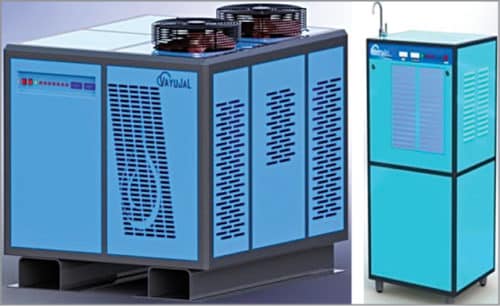The scarcity of clean water and its access is affecting the entire human population, be it directly or indirectly. Along with natural causes like droughts, reasons like the rising population and global warming are hugely responsible for adding to this pressure. Clean, fresh, and safe water is not only essential for drinking but also for food production, besides other important uses. Indian cities, too, will run out of or contaminate groundwater and surface water resources completely in a few years, if proper measures are not taken.
This is where an IIT Madras-incubated company VayuJal Technologies, which aims to translate advanced technologies for social good came up with a unique solution to deliver clean water suitable for drinking and other day-to-day purposes on-demand, that is, when and wherever required with quality assurance. The team, consisting of founders Thalappil Pradeep, Ramesh Kumar, and Ankit Nagar in 2017, raised a seed fund from Engineers India Limited (EIL) under the Startup Fund scheme.
Their environmentally sustainable device, atmospheric water generator (AWG) unit, captures moisture available in ambient air. The units are made with patented surface engineering technology, energy-efficient unit design, and mineralisation technology that expands their water collecting efficiency. The moisture is condensed and collected into a tank. The condenser is made using nanotechnology incorporated products such as biomimetic, nano-engineered, and micro-nano structure patterned surfaces. Modular water purifier cartridges remove undesirable impurities present in water. Re-mineralisation cartridges then add essential minerals (calcium, magnesium, iron, copper, potassium, sodium, selenium, zinc, cobalt, vanadium, and molybdenum) to purified water in a sustainable and controlled manner.
The cost is significantly less than that of currently available bottled mineral water. As these units can run on off-grid solar panel systems, these are highly beneficial in remote or rural areas where water cannot be made available due to issues like financial constraints. Energy consumption of solar products is low, which makes them suitable for commercial purposes, thereby boosting the renewable energy sector. The water quality complies with BIS – IS 2012 and all necessary World Health Organization (WHO) standards, and maintenance is customer-friendly.

The company offers variable capacity machines to cater to several applications such as irrigation, army tanks, construction sites, and more. The startup has introduced multiple variants of AWGs, including VJ-30 LPD unit (small-scale generator), VJ-100 LPD unit (domestic purposes), VJ-400 LPD unit (commercial purposes), and VJ-2000 LPD unit (solar-powered off-grid settlements). For these units to work properly and efficiently, the temperature should lie between 20 and 42 degrees Celsius with a relative humidity of 35-99 per cent. The weight and size of these units vary based on the requirement for the rated production capacity.
Devices that have been installed in various places like schools, restaurants, houses, offices, and so on, have already dispensed more than 85,000 litres of water. The team is also working on a VJ-1000 LPD unit, and with its expansion to more cities and other deprived regions, the demand-supply gap for potable water will gradually diminish.













Hello !
Could you please share the complete info of #Solving water crisis air nanotechnology with the document and its prototype